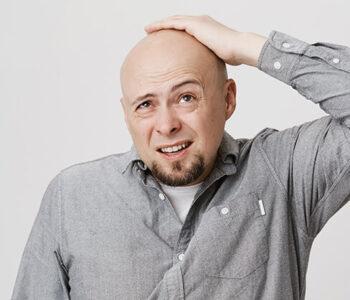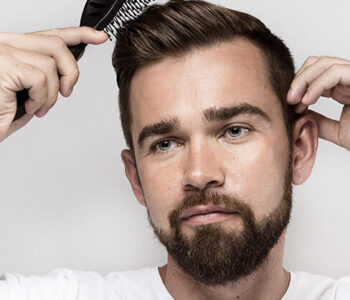In 30 Seconds…
One fifth of men will have experienced hair loss by age 20. This increases proportionally, with 30% of men in their 30s and 40% of men in their 40s noticing a little (or a lot) less thatch*
The good news? Even with medical conditions that cause hair loss, such as telogen effluvium, your hair will usually grow back within 3-6 months. Healthy changes in lifestyle and diet are known to help make a difference.
Protein provides the essential building blocks that your hair needs to grow, so chow down on lean meat, eggs, fish, beans, grains and nuts. Make sure you’re getting enough iron too.
Crew cut. Silver fox. Mullet. Whatever your preferred style, we all want the kind of shampoo-ad thick, full head of hair that we deserve. Or as close to as possible. Thing is, while there’s no cure to reverse hair loss in most cases, there are some nifty science-based tricks to slow things down – and make the most of what you have. Because great men deserve great hair.
Here’s our guide to winning the battle, one follicle at a time.
THE FACTS
If you’re noticing you have less up top, it’s normal to feel anything from mildly worried to full-scale panic. Hair loss can bring up a lot of feelings, from worrying about attractiveness to a fear of ageing. First of all, deep breaths. It’s not as a bad as you think. And we’re all in the same boat. One fifth of men will have experienced what “significant hair loss” by age 201. Yep. We know right?! And this increases proportionally, with 30% of men in their 30s and 40% of men in their 40s noticing a little (or a lot) less thatch.2
According to research, high levels of stress can impact hair loss in both men and women.3 The stress hormone cortisol is thought to affect the function of our hair follicles, with high levels having a damaging effect. Another good excuse for that weekend lie in.
MEDICAL HAIR LOSS CONDITIONS
Medically, there are three types of hair loss which are synonymous with high stress levels: telogen effluvium, trichotillomania and alopecia areata. Telogen effluvium often occurs after a traumatic event and although it’s a temporary condition, you can lose a large portion of your hair for up to six months.4 It’s less likely to affect men than women. You’re possibly suffering from it if you notice large amounts of hair on your brush or pillow.
Trichotillomania is associated with people pulling hair from their scalp and is often caused by psychological issues and negative feelings, such as loneliness or frustration.5 Alopecia areata happens when your immune system attacks your hair follicles and this leads to hair loss. Doctors encourage you to seek medical advice if you notice significant hair loss in a short period of time, as it could be a warning sign of an underlying medical condition.6
Which, admittedly, all sounds very stressful – but don’t worry. Most male pattern baldness and normal hair loss is not only common, but genetic and completely normal. It’s simply useful to look at the causes of the medically-understood hair loss conditions in order to glean some handy info on how stress may be making your hair loss worse – and more importantly, how to combat it with a few simple lifestyle changes.
THE GOOD NEWS
Even with medical conditions that cause hair loss, such as telogen effluvium, your hair will usually grow back within 3-6 months.7 Healthy changes in lifestyle and diet are known to help make a difference.8 Time to go all zen when it comes to tackling stress. Here’s what the experts suggest:
1. SWITCH UP YOUR RATIONS
Doctors agree that a healthy diet is one of the best things you can do for a thick, windswept barnet.9 Protein provides the essential building blocks that your hair needs to grow, so chow down on lean meat, eggs, fish, beans, grains and nuts. Make sure you’re getting enough iron too; try adding more red meat, liver, dark green leafy vegetables and lentils to your plate.
2. GET MORE SHUT EYE
Good in bed? We don’t mean in that way. Hit the sack earlier when you can to give your follicles a boost. Sleep allows the body to regenerate and repair.10 Plus studies have found that melatonin, the hormone that regulates your sleep and wake cycles, also has an effect on hair growth.11
3. GET CLEAN
Stop smoking or at least cut back. Same goes for alcohol. Both in excess can lead to nutrient deficiencies due to problems with absorption. Iron and zinc particularly can have their absorption inhibited by alcohol consumption, and both are necessary for healthy hair growth. Do the maths.12
4. STRESS LESS
While the above list will help your body manage stress better, sometimes you need to tackle the root of the problem. If your workload is out of control then speak to your boss. Relationship issues? Talk it out. Make time in your life for regular exercise and chill time. Put yourself first. Your hair will thank you for it.












